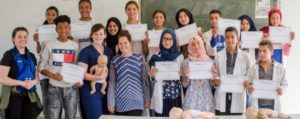
Featured Photo: L-R: Danielle Sharples (black shirt and green jacket), Olivia Klenert, RN and Meaghan Koudelka (blue and white stripped top) pose with one of the classes they taught while abroad.
HYANNIS – Ever since Olivia Klenert, RN, was a nursing student at UMass Dartmouth, she has dreamed of traveling to other countries to improve healthcare in areas where services were lacking.
When her best friend, Meaghan Koudelka, began working for the Peace Corps in Morocco, it seemed like a perfect opportunity to realize her dream. Koudelka works in community and youth development in Ouarzazate, a small city fringed by palm groves between the desert and the mountains of southern Morocco. She had seen firsthand that basic health knowledge was lacking in the community.
Together, the women brainstormed how they could combine their strengths and help the people of Ouarzazate, and a lifesaving mission blossomed. They would teach local students first aid skills.
Klenert, now a nurse in Cape Cod Hospital’s Emergency Room, obtained her BLS (Basic Life Support) instructor license in first aid and CPR(cardiopulmonary resuscitation) through the American Heart Association in preparation for the trip. In April, with money raised through a GoFundMe campaign, Klenert purchased three adult and three infant mannequins and a choking vest (which helps students simulate the Heimlich maneuver), packed them in a large suitcase (using a backpack for her personal belongings), and embarked on the long journey to Ouarzazate.
Over three days, she and Koudelka, along with photographer/graphic designer Danielle Sharples (another college friend, who designed and made the certificates and took all the photos) and a local translator, worked in the middle and high schools teaching basic CPR and first aid skills to 121 students. The students learned chest compressions, the Heimlich maneuver, first aid for heat stroke, dehydration, cuts and bruises; and other basic skills.
“There are no health programs in these communities, so people haven’t been taught simple things like cleaning cuts and covering them,” Klenert said, adding that in an emergency, it can take an ambulance from a larger city up to three hours to get to the rural area.
A Huge Success
The classes were a huge success, she said. Everyone was excited and welcoming. One of the teachers told Klenert the students were talking about how they learned to “save babies.”
“One female student had so many insightful questions and showed interest in furthering her education. She asked about heat stroke, and wanted more opportunities to practice more to be sure she was doing chest compressions correctly,” Klenert said. “It was wonderful to have students interested and invested in it.”
Many female students leave school in adolescence, so it is rare for women to work in science professions in Ouarzazate, she explained.
“They really have to push themselves if they want to go to school. It is possible for women to continue their education, but higher education is not as encouraged as it is in the U.S. To see that they were actively engaged was incredible,” she said. “The principals were so appreciative; they wanted us to stay longer. We left the equipment so the students can continue to learn if they’re interested, along with a Basic Life Support manual in Arabic.”
At the end of the classes, the students received certificates signed by the school principals commemorating their new skills.
Klenert was thrilled with the community’s reception. Her friend had warned her that this, their first mission, was going to be trial and error.
“We’re not trying to save the world; we just want to teach and provide the tools so others can learn,” she said. “We were ready for the worst, but got the best.”
In the future, the women hope to go back when the school can have them, and perhaps take their classes to a different town.
As an ER nurse, Klenert sees everything from lacerations and fractures to cardiac arrests. She works directly with patients and administers medications. She hopes to get a Master’s degree in public health and work in the U.S. and abroad.
“Emergency is my home base, but I want to get more involved in sustainability,” she said. “I love working in the ER, but I love to go places where they really need help, and see the difference we’re making.”
She’s already planning her next trip, volunteering in a clinic in Nicaragua this fall.
























